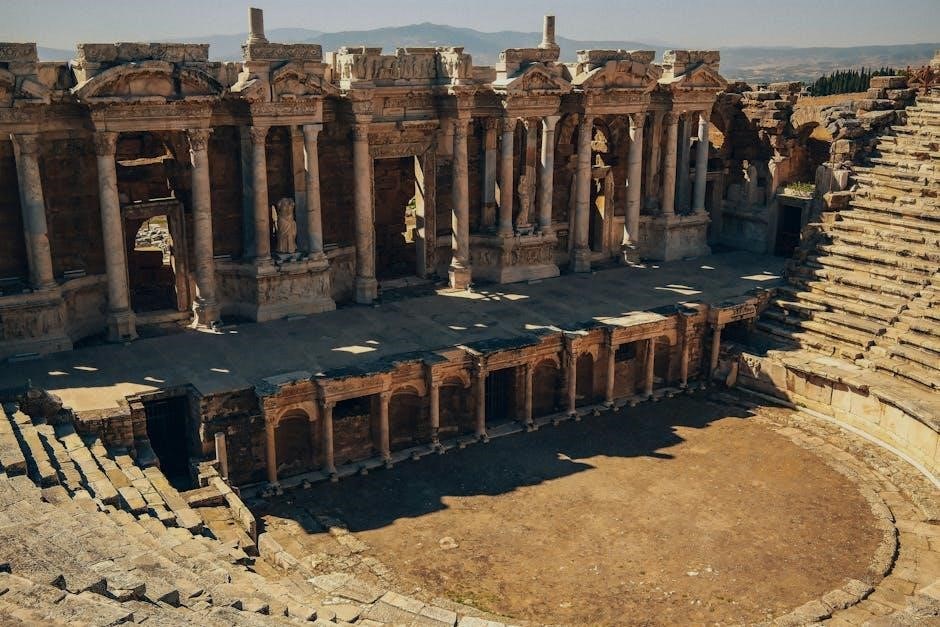Exploring lessons from antiquity offers timeless insights into human history‚ culture‚ and development. This section introduces the significance of studying ancient civilizations and their enduring impact on modern society and thought.
What Are Lessons from Antiquity?
Lessons from antiquity refer to the knowledge‚ insights‚ and wisdom derived from ancient civilizations. These lessons encompass a wide range of subjects‚ including law‚ governance‚ philosophy‚ art‚ and science‚ offering a glimpse into the achievements and challenges of early societies. By studying these lessons‚ modern learners gain a deeper understanding of humanity’s shared past and its influence on contemporary life. Antiquity’s teachings often highlight universal themes such as justice‚ ethics‚ and the human condition‚ providing timeless guidance for addressing modern dilemmas. These lessons are not just historical relics but practical tools for fostering critical thinking‚ creativity‚ and resilience. They remind us of the enduring relevance of ancient ideas in shaping our present and future‚ making them invaluable for personal and collective growth.
Why Study Antiquity in the Modern World?
Studying antiquity in the modern world provides valuable insights into the origins of human civilization‚ culture‚ and thought. Ancient societies laid the foundation for many of the ideas‚ practices‚ and institutions we rely on today‚ such as democracy‚ law‚ and philosophy. By examining the achievements and challenges of antiquity‚ we gain a deeper understanding of how past innovations and errors shape contemporary issues. This knowledge fosters critical thinking‚ enabling us to address modern problems with a broader perspective. Additionally‚ antiquity offers timeless lessons on ethics‚ leadership‚ and resilience‚ which remain relevant in addressing global challenges like inequality‚ environmental sustainability‚ and conflict resolution. Understanding our shared heritage also promotes cultural appreciation and empathy‚ bridging the gap between past and present. Ultimately‚ studying antiquity enriches our ability to navigate the complexities of the modern world while honoring the legacy of those who came before us.

Key Civilizations of Antiquity
Ancient Mesopotamia‚ Egypt‚ Greece‚ Rome‚ China‚ and the Indus Valley shaped human history. Each civilization contributed uniquely to culture‚ governance‚ and innovation‚ leaving lasting legacies that influence modern societies globally today.
Ancient Mesopotamia: The Cradle of Civilization
Ancient Mesopotamia‚ often called the “Cradle of Civilization‚” was a region of immense cultural‚ social‚ and technological advancement. Located between the Tigris and Euphrates rivers‚ it was home to some of the world’s earliest cities‚ such as Ur and Babylon. The invention of writing (cuneiform)‚ the development of sophisticated irrigation systems‚ and the creation of laws (e.g.‚ the Code of Hammurabi) highlight its significance. Mesopotamia also saw the rise of city-states‚ each with its own governance structure‚ contributing to the evolution of political systems. The region’s fertile land supported agriculture‚ enabling population growth and the emergence of complex societies. Its legacy includes advancements in mathematics‚ astronomy‚ and literature‚ such as the Epic of Gilgamesh‚ one of the earliest known literary works. The architectural marvels‚ like ziggurats‚ further showcase the ingenuity and creativity of the Mesopotamians‚ leaving a lasting impact on human history and modern civilization.
Ancient Egypt: A Legacy of culture and science
Ancient Egypt: A Legacy of Culture and Science
Ancient Egypt left an indelible mark on human history through its rich culture and scientific advancements. Their architectural achievements‚ such as the pyramids and temples‚ exemplify advanced engineering and artistic expression. Egyptian culture emphasized religion‚ with elaborate rituals and a complex pantheon of gods‚ influencing art and daily life. In science‚ Egypt made significant strides in medicine‚ mathematics‚ and astronomy. The Edwin Smith Papyrus‚ one of the oldest medical texts‚ highlights their understanding of anatomy and surgical practices. Their decimal system and calendar laid foundations for modern mathematics and timekeeping. Astronomy was deeply intertwined with religion‚ as they studied celestial bodies to align earthly events with divine will. These contributions not only shaped their society but also laid the groundwork for future civilizations‚ making Ancient Egypt a cornerstone of human progress and innovation.

Contributions to Modern Society
Ancient civilizations laid the groundwork for modern advancements. Their innovations in law‚ medicine‚ engineering‚ and philosophy continue to shape contemporary life‚ proving the lasting value of antiquity’s intellectual and practical achievements.
Scientific and Technological Advances
Ancient civilizations made groundbreaking contributions to science and technology. The invention of the wheel in Mesopotamia revolutionized transportation and trade‚ while Egyptian advancements in architecture and engineering‚ such as the pyramids‚ showcased their mastery of construction techniques. The Babylonians developed sophisticated irrigation systems and astronomical observations‚ laying the foundation for modern agriculture and astronomy. In ancient Greece‚ philosophers like Aristotle and Archimedes pioneered scientific inquiry‚ making significant strides in physics‚ mathematics‚ and medicine. The concept of the scientific method and early anatomical studies by Galen influenced later medical advancements. These innovations not only shaped their contemporary worlds but also provided the building blocks for modern scientific and technological progress‚ demonstrating the enduring legacy of antiquity’s intellectual achievements.
Artistic and Architectural Achievements
Ancient civilizations left a profound legacy in art and architecture that continues to inspire modern creativity. Egyptian monuments‚ such as the pyramids and tombs‚ exemplify precision and grandeur‚ while Greek temples like the Parthenon embody harmony and proportion. Roman engineering feats‚ including aqueducts and the Pantheon‚ showcased their mastery of concrete and innovative design. Artistic expressions‚ from Greek sculptures to Roman mosaics‚ captured human form and storytelling with remarkable skill. These achievements not only reflected the cultural and religious values of their time but also established timeless standards of beauty and functionality. The influence of ancient art and architecture is evident in modern designs‚ proving their enduring relevance and the creativity of our ancestors.

Philosophical and Ethical Lessons
Philosophical and ethical lessons from antiquity shaped modern thought. Socrates‚ Plato‚ and Aristotle explored ethics‚ logic‚ and virtue‚ while Eastern philosophers like Confucius and Buddha taught moral behavior and compassion‚ influencing justice and personal conduct.
Foundations of Western Philosophy
The foundations of Western philosophy trace back to ancient Greek thinkers like Socrates‚ Plato‚ and Aristotle. Socrates emphasized critical thinking and ethics through his method of questioning. Plato explored metaphysics‚ epistemology‚ and political philosophy‚ envisioning an ideal society in The Republic. Aristotle‚ his student‚ systematized knowledge across various fields‚ from logic to biology. Together‚ they laid the groundwork for rational inquiry and intellectual discourse. Their ideas influenced later philosophers‚ shaping concepts of justice‚ morality‚ and human nature. The Stoics and Epicureans further developed ethical theories‚ focusing on virtue and the pursuit of happiness. These philosophical traditions continue to resonate in modern thought‚ underscoring the enduring relevance of antiquity’s intellectual legacy.

Ethical Teachings from Ancient Cultures
Ancient cultures imparted profound ethical teachings that shaped moral frameworks across civilizations. The Code of Hammurabi from Mesopotamia emphasized justice and accountability‚ while ancient Egyptian teachings stressed truth‚ harmony‚ and balance. In China‚ Confucius advocated for ren (benevolence)‚ yi (righteousness)‚ and li (etiquette)‚ fostering social cohesion. Similarly‚ the Golden Rule—”do unto others as you would have them do unto you”—appeared in various forms‚ reflecting a universal moral principle. Greek philosophers like Aristotle explored virtues such as courage‚ wisdom‚ and temperance. These ethical systems transcended time‚ influencing religious‚ philosophical‚ and legal traditions. They underscored the importance of compassion‚ fairness‚ and self-discipline‚ offering timeless guidance for personal and societal well-being. By studying these teachings‚ we gain insights into the shared human quest for moral excellence and a harmonious society.

Political and Social Structures
Ancient societies developed diverse political systems‚ including monarchies‚ democracies‚ and oligarchies‚ shaping social hierarchies and inequalities that influenced future governance and societal structures.
Forms of Government in Antiquity
Ancient civilizations experimented with various forms of governance‚ shaping political thought. Mesopotamia saw city-states ruled by kings‚ while Egypt’s pharaohs held divine authority. In China‚ the Zhou Dynasty introduced feudalism. Greece pioneered democracy in Athens and oligarchy in Sparta‚ whereas Rome developed a republic with elected officials. These systems laid the groundwork for modern political ideologies‚ emphasizing balance‚ representation‚ and civic participation. Despite limitations‚ they showcased humanity’s early efforts to organize and govern societies effectively‚ leaving a lasting legacy in political philosophy and practice.
Social Hierarchies and Inequality
Ancient societies were often structured around rigid social hierarchies‚ with inequality deeply embedded in their systems. In Mesopotamia‚ kings and priests held power‚ while slaves and laborers formed the lower classes. Ancient Egypt similarly had a stratified society‚ with pharaohs at the top and peasants at the bottom. In China‚ the Zhou Dynasty’s feudal system reinforced social divisions‚ and in India‚ the caste system institutionalized inequality. These hierarchies were often justified through religious or cultural beliefs‚ with certain groups deemed inferior by birth. Women‚ in particular‚ faced widespread marginalization across ancient civilizations. Slavery was another pervasive feature‚ with enslaved people denied basic rights. Despite these inequalities‚ some societies‚ like ancient Athens‚ began to question such structures‚ laying the groundwork for future social reforms. Studying these systems provides insights into how inequality has shaped human history and its ongoing impact on modern societies.

Cultural and Religious Influences
Ancient cultures and religions profoundly shaped societal practices‚ beliefs‚ and values. Their rituals‚ myths‚ and ethical frameworks continue to influence modern traditions‚ highlighting humanity’s enduring quest for meaning and connection.
Mythology and Religion in Antiquity
Mythology and religion played central roles in ancient societies‚ serving as frameworks for understanding the world and guiding human behavior. These systems of belief were deeply intertwined with culture‚ shaping art‚ literature‚ and philosophy. Myths often explained natural phenomena‚ while religions provided moral and ethical foundations. Polytheistic religions dominated many ancient civilizations‚ with pantheons of deities like Zeus‚ Odin‚ and Ra‚ each associated with specific domains. Rituals‚ sacrifices‚ and festivals were integral to communal life‚ reinforcing social bonds and divine connection. The rise of monotheistic religions‚ such as Judaism‚ Christianity‚ and Islam‚ marked a significant shift in theological thought. These belief systems not only influenced ancient societies but also left a lasting legacy in modern cultures‚ ethics‚ and spirituality. Understanding these traditions offers insights into humanity’s enduring quest for meaning and transcendence.
Cultural Practices and Traditions
Ancient civilizations developed rich cultural practices and traditions that shaped their identities and values. From religious rituals to social ceremonies‚ these customs reflected societal norms and beliefs. In Mesopotamia‚ festivals honored gods and celebrated agricultural cycles‚ while in Egypt‚ elaborate burial rites ensured immortality. Greek and Roman cultures emphasized public spectacles like theater and gladiatorial games‚ fostering communal bonding. Art‚ music‚ and dance were integral to expression‚ as seen in Indian classical traditions and Chinese calligraphy. These practices not only preserved cultural heritage but also influenced modern customs. Understanding these traditions provides insight into the evolution of human culture and highlights the enduring importance of shared rituals in fostering unity and identity. By studying these ancient practices‚ we can better appreciate how they continue to inspire and shape contemporary traditions worldwide.

Historical Events and Their Impact

Pivotal events in antiquity‚ such as the rise and fall of empires‚ shaped human history. These moments influenced political structures‚ societal norms‚ and cultural legacies‚ leaving lasting impacts on the modern world.
Major Conflicts and Their Consequences
Major conflicts in antiquity‚ such as the Peloponnesian War and the Punic Wars‚ profoundly shaped ancient societies. These wars often arose from territorial disputes‚ resource competition‚ and political rivalries. Their consequences were far-reaching‚ leading to the rise or fall of empires‚ economic devastation‚ and societal upheaval. For instance‚ the Peloponnesian War weakened Greek city-states‚ paving the way for Macedonian dominance. Similarly‚ the Punic Wars established Rome as a dominant power while crippling Carthage. These conflicts also spurred technological and strategic innovations in warfare‚ such as advanced siege weaponry and naval tactics. Additionally‚ they influenced political structures‚ as victors often imposed their systems of governance on conquered territories. The legacies of these conflicts remain evident in modern international relations‚ diplomacy‚ and military strategies; Studying these events provides insights into the complexities of human conflict and its enduring impact on global history and culture.
The Rise and Fall of Empires
The rise and fall of empires in antiquity provides valuable lessons about power‚ governance‚ and the cyclical nature of human history. Empires often emerged through military strength‚ strategic alliances‚ and economic dominance. However‚ their decline frequently resulted from overextension‚ internal corruption‚ and external pressures. The Roman Empire‚ for instance‚ expanded vastly but succumbed to political instability and external invasions. Similarly‚ the decline of the Persian Empire highlights the challenges of maintaining vast territories and cultural diversity. These historical patterns reveal universal truths about the limitations of centralized power and the importance of adaptability. By studying these dynamics‚ modern societies can better understand the complexities of leadership and the importance of sustainable governance. The rise and fall of empires serves as a reminder of the transient nature of power and the enduring impact of human ambition and resilience.

The Answer Key as a Study Tool
The answer key serves as an essential resource for verifying understanding and identifying knowledge gaps. It provides clear‚ concise answers to guide effective learning and preparation for assessments on antiquity.
How to Use the Answer Key Effectively
To maximize the benefits of the answer key‚ start by reviewing it after attempting questions on your own. This helps identify gaps in your understanding and clarifies complex concepts. Pay attention to explanations provided for incorrect answers‚ as they often contain valuable insights. Organize your study sessions by focusing on topics where you struggle the most‚ using the key to guide your revision. Regularly test yourself with practice questions and refer to the key to track your progress over time. Additionally‚ use the key in conjunction with your study materials‚ such as textbooks or lecture notes‚ to reinforce learning. Avoid relying solely on the key for answers; instead‚ treat it as a tool to enhance your comprehension and retention of the subject matter. By following these strategies‚ you can utilize the answer key effectively to achieve academic success.
Common Pitfalls and Misconceptions
When studying lessons from antiquity‚ it’s important to avoid common pitfalls. One major misconception is assuming all ancient societies were uniform or static. Many students overlook the diversity and evolution of cultures over time. Another mistake is romanticizing ancient civilizations‚ which can lead to overlooking their flaws‚ such as inequality or violence. Misinterpreting historical context is another pitfall; for example‚ applying modern values to ancient practices can distort understanding. Additionally‚ relying solely on secondary sources without consulting primary texts can perpetuate inaccuracies. Students should also be cautious of outdated theories or biases in historical interpretations. To avoid these errors‚ encourage critical thinking‚ cross-referencing sources‚ and understanding the historical context. By doing so‚ learners can gain a more nuanced and accurate understanding of antiquity’s complexities and relevance to the modern world.
The study of antiquity provides invaluable insights into humanity’s past‚ shaping our understanding of the present. By embracing these lessons‚ we can better navigate modern decisions and fostering innovation for a brighter future.
The Relevance of Antiquity Today
Studying antiquity remains profoundly relevant in understanding modern society. Ancient civilizations laid the groundwork for cultural‚ scientific‚ and political advancements that continue to shape our world. From philosophical ideas to technological innovations‚ the lessons of the past provide valuable insights into human nature and progress.
By examining ancient governance and social structures‚ we can better understand the evolution of modern systems. Moreover‚ artistic and architectural achievements from antiquity inspire contemporary creativity.
The study of mythology and religion offers perspectives on human belief systems and their enduring influence. In a rapidly changing world‚ the wisdom of antiquity serves as a reminder of our shared heritage and its ongoing impact on global development.
